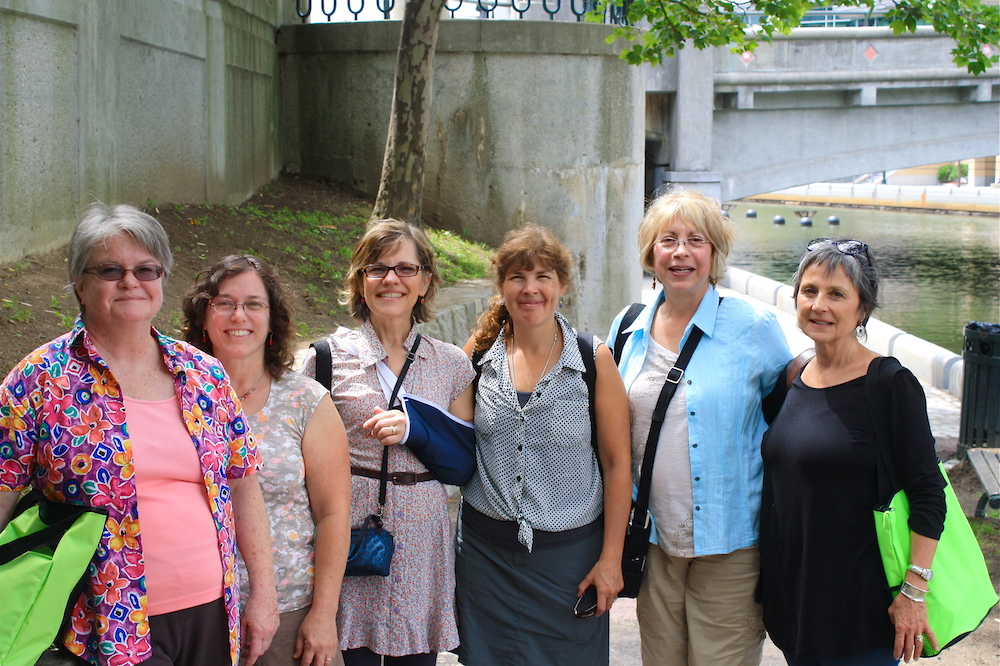From a very biased viewpoint: Mine! A group of Rochester Guild members -- including two "Convirgins," as weavers affectionately call those who are attending the convention for the first time -- journeyed to Providence on Wednesday, July 16, to see the fashion show and the exhibits. And, of course, the vendors.
For those who aren't familiar with what Convergence is: this is the biennial convention of the Handweavers Guild of America, held somewhere in the continental United States and drawing a couple of thousand weavers, teachers, exhibitors, and vendors from all over the world. It is an inspiring event and -- because it's usually held on the West Coast -- I was not about to miss it.
For those who aren't familiar with what Convergence is: this is the biennial convention of the Handweavers Guild of America, held somewhere in the continental United States and drawing a couple of thousand weavers, teachers, exhibitors, and vendors from all over the world. It is an inspiring event and -- because it's usually held on the West Coast -- I was not about to miss it.
My traveling companions (left to right): Leslie Mendelson, Karen Berk, Hope Herting, Jenn Snyder, Teri Silsby, and me. Jenn, a Rhode Island native, was our wonderful hostess AND tour guide.
Among the many tempting vendors: Master weaver Randy Darwall,
whose scarves are pictured above
The Glimakra booth, which to me is pretty much
the weaving equivalent of Disneyworld....
None of us took classes, but instead visited the exhibits and toured the Providence area -- again, guided by Jenn Snyder. The fashion show was a highlight and spurred a lot of discussion. The first-place winner was not a weaver, for instance, but the garment itself was masterful and showed great skill in surface design, couture sewing, and garment design.
(I had an item juried into the show -- but found out at the last minute that my garment had been disqualified because there was a tear in the back seam. I was told that they had received the garment that way, but there is no way on earth I would have shipped it like that. Most likely, it tore when a model tried it on. Still, quite honestly, the fabric was fragile and I had not reinforced the seam. I learned NOT to do that again, for sure. A painful experience but also a lesson.)
Moving on: the Complex Weavers exhibit, named "Complexity," was a highlight of the conference for me. Again, for those who don't know, Complex Weavers is an international organization of handweavers who are interested in working with more than four harnesses -- although four-harness weaving is also explored by this group, as it can offer many challenges for advanced weavers.
A dimensional wall hanging by Susie Taylor,
double woven on 10 shafts with an origami layer
Bonnie Inouye, whose work I admire greatly, wove this Echo weave piece
with looped and interlocked strings on 24 shafts
A detail of a Jacquard-woven piece by Lois Bryant,
in weft-backed 8-shaft twills and 16-shaft satin
One of my personal favorites: a scarf by Lesley Willcock
created from network threading, woven on 32 shafts
in a treadling range of 8-end satins
The first-place winner was another piece by Lesley Willcock: a 4-color double weave
using an extended parallel on a network threading and woven on 32 shafts
Another personal favorite: a fancy twill scarf by Carol Wooten woven on 32 shafts
This scarf is by Elizabeth Calnan, woven on 32 shafts
in a double-weave point threading
So much to see, so much to learn! With all the conversations, reading, and viewing, my head was fit to burst. The ideas will last me for at least two years -- until the next Convergence, just about....














No comments:
Post a Comment